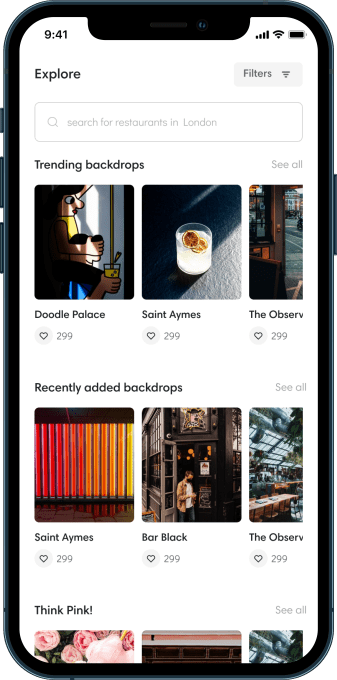Products You May Like
In the summer of 2019, Timilehin Ajiboye became intrigued with the idea of building a travel app after conversations with a circle of friends.
One friend reached out to Ajiboye asking if he knew of any platform where she could find new, aesthetically pleasing places to dine in, visit and take pictures. And then, during a trip to Miami, he and his friends actively sought out beautiful places to eat — and take photographs.
No doubt: These needs are pretty vain. But Backdrop is not unlike other global social media platforms that allow users to take ephemeral photos, flex their lifestyle on disappearing stories or discover millions of personalized short videos.
And while social media, growing exponentially over the past decade, has changed the way we communicate and connect, it has also changed how we travel.
More than 36% of social media users use platforms for travel ideas, according to Statista; over 60% of these people share photos when traveling.
Instagram controls most of this traffic, yet Ajiboye believes that the process of sourcing travel-related information on the platform has become ridiculously time-consuming. He argues that massive platforms like Instagram that venture into any content created a need for niche platforms.
“Instagram is like an operating system for pictures. Everything is happening on Instagram — travel, beauty, e-commerce. Same with Pinterest,” he said to TechCrunch in an interview. “Increasingly, you’ll find that for some people, they use these platforms for travel and there hasn’t been any experience created for travel that takes into consideration 2021, which is people like to take pictures in front of places that look great and share with their friends.”
Ajiboye came up with the name Backdrop and reached out to two friends, Damilola Odufuwa and Odunayo Eweniyi, to build the platform and turn it into a company.
Social media and travel
There’s currently no go-to platform to find attractive places just for the sake of it. The founders say Backdrop is primarily built for this, as well as travel discovery.
For instance, travelers vacationing in Dubai and seeking trendy places tend to do three things: quiz friends and acquaintances, run a Google search, or punch in a hashtag on Instagram.
“If you run a Google search or use Instagram, everything comes up, including results irrelevant to your search,” Odufuwa said. “If you’re looking for pink restaurants in Dubai, you might not be able to get that on Instagram, and Backdrop changes all of that.”

Image Credits: Backdrop
With Backdrop, users can discover and share beautiful places to take pictures based on their interests and criteria. The founders believe that with post-pandemic travel becoming more complex, Backdrop can serve as a travel companion for millennials and Gen Zs, especially those obsessed with traveling to pretty places.
The critical information on each backdrop includes opening and closing times, address (linked to Google Maps), cost and entry fee (if any), Wi-Fi availability, pet policy, outdoor seating, wheelchair access, and dress code.
TechCrunch spoke to a few Backdrop beta users. Depending on their interests, two camps emerged. Some enjoy its Collection feature, which allows them to save backdrops, combining the worlds of Google Maps and Pinterest. Others prefer the Explore feature, viewing it as a combination of Google Maps and Instagram.
With hashtags, users can find specific places, and the “Backdrop Near Me” feature allows them to discover other places they can visit close to their current Backdrop location.
The company has a photo research team that finds these places across 26 cities globally. They also take pictures and input the necessary information in each backdrop.
While Backdrop wouldn’t comment on the number of users in beta, the founders say its research team has collated thousands of pictures from these cities: Amsterdam, Dubai, Istanbul, London, Los Angeles, New York, Seoul, Paris, Tokyo, Cape Town, New Orleans, San Francisco, Chicago, Las Vegas, Miami, Marrakech, Fez, Tangier, Rabat, Cancun, Cabo, Tulum, Lagos, Abuja, Madrid and Valencia. On average, there are 100 to 300 pictures in each city on the platform.
Using a dedicated team to upload pictures is not scalable in the long run and Backdrop knows this. Therefore, the company allows users to upload backdrops themselves and input the necessary information on each. Other users review the posts before listing on the platform, either by upvotes or downvotes. They can also review others and earn redeemable points for helping build the community.
“That’s how we’re trying to transition from having to personally curate backdrops and letting the community decide the sort of backdrops that make it to the platform,” Ajiboye said.
“While there are cases where not necessarily the best photo or content is on top of the search, there’s a kind of democracy involved in crowdsourcing votes on content or, in our case, backdrops. From our end, we try to detect if the information is accurate, too, automatically.”
Backdrop plans to add 20 more cities this year and has secured a FAF round to scale the product. But with scale comes more responsibility, a phrase the three founders have grown accustomed to over the years.
The trio met over six years ago at a Zikoko, an Africa-focused youth publication, and their careers in tech and digital media branched out from there.

Image Credits: Backdrop. Backdrop founders Odunayo Eweniyi (COO), Damilola Odufuwa (CEO), and Timilehin Ajiboye (CTO)
Odufuwa, who acts as Backdrop CEO, leads PR for Binance in Africa. She is also the co-founder of the Feminist Coalition, a Nigeria-based womens’ rights and equality group, alongside Eweniyi, who is Backdrop’s COO.
Eweniyi is also the COO at PiggyVest, one of the most popular fintech platforms in Nigeria.
CTO Ajiboye is the executive and technical head at crypto-powered remittance product Sendcash and YC-backed cryptocurrency platform Buycoins.
Building a global product
While the founders have handled several ventures, they have primarily been Nigeria- or Africa-focused. But Backdrop is quite different; the target market is a global one. So I couldn’t help but ask the founders: Did they feel focused or capable enough to run the company?
Odufuwa answered by saying running a global product isn’t any different. Because each founder has run multiple ventures in quick succession, they will not see any problem adding Backdrop to the mix.
“I think we [millennials and GenZs] are just really good at juggling. And though it might come with exhaustion and burnout, you learn to juggle and I think that’s life in general. But I know we’re 100% committed.”
Ajiboye added that while the founders are great teammates and leaders, they will need to build a global team to sustain the company in the long run.
“People have done way more complex things all at the same time, so I don’t think that will be an issue,” Ajiboye joked.

Social media platforms are known to be hyper-focused on user growth before making revenue or profits. And Backdrop, being one of the few social platforms built by Africans that stands a chance to catch on with a global audience, does not plan to be an exception.
Should it gain significant traction, the founders have some ideas on how the platform will make revenue, citing advertising, bookings, reservations, tourism from private and public partnerships, and revenue from content creators as some examples.
“There are many opportunities with discovery and content creation around travel,” Ajiboye said. “What’s very important is that a community has to exist and our early users will shape what the platform is. So right now, growth is the priority and we think there are different ways money can be made.”
